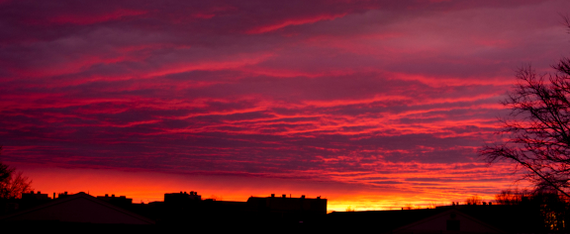
About the Program
Meteorology is the study of weather, climate, and the characteristics, structure, and processes of the atmosphere. Students learn how to forecast the weather and how to understand climate change. The emphasis of the Bachelor of Science degree program in Meteorology is on developing a broad understanding of the fundamental physical and dynamic processes governing the motions and behavior of the atmosphere, and its interactions with the underlying land and ocean surfaces. Basic courses in chemistry, physics, and mathematics are the prerequisite foundation on which the meteorology program is built. Students who wish to pursue an undergraduate meteorology degree should have a strong high school or equivalent background in mathematics and the sciences prior to enrollment. This is the only program in New Jersey that meets all the U.S. federal government civil service requirements for classification as a meteorologist and the American Meteorological Society's recommendations for undergraduate meteorology programs.
Alumni Spotlight

Robert Bennett is a meteorologist with the National Weather Service in Dodge City, Kansas. Being new to the agency, Robert primarily works Decision Support Services shifts where he messages about the weather, with a focus on its impacts, to social media and partners. On shift, Robert also quality controls climate data, records soil temperatures, issues weather information products, launches weather balloons, collects storm reports, and performs other tasks that arise. Robert is also going through training in order to issue severe weather warnings where he will use new research and radar evaluation techniques in hopes to lower false alarms while increasing lead time for severe weather. Robert is also a member of the Warning Coordination Meteorologist (WCM) Support Team that helps support the WCM in participating in office outreach activities like office visits, school visits, tabletop exercises, Storm Ready evaluations, radio interviews, and spotter talks. He also got to tag along on a storm damage survey where he assisted in evaluating and determining damage sustained to a local high school from a microburst with winds up to 85 mph.
Overall, Robert has a little over two years of professional experience in Meteorology. He started his career at AccuWeather in Wichita, Kansas, where he worked directly with clients all over the world to give them valuable weather information so they could make decisions for their operations. While not at work, Robert enjoys spending his time outdoors, especially storm chasing. During his storm chasing travels, he has seen 16 tornadoes (across 6 different states), numerous instances of large hail, and destructive winds. He also enjoys watching the Phillies and Patriots. Robert graduated from Rutgers University in Summer 2022 with a double major in Meteorology and Geography, with minors in Geological Sciences and Music. He says that his time at Rutgers in the Meteorology Program was instrumental to his success as it laid the foundation to a successful career so far. Robert says he learned a great deal in all his classes, made great connections, and met great friends, many of which he is still in contact with today!
Student Success
Past graduates of the program have found employment in the National Weather Service, private forecasting organizations, academic/research institutions, consulting firms, the media, and Fortune 500 companies. Others apply their meteorological background in related fields such as high-school education and scientific programming. Graduates seeking advanced degrees have gone on to study at a variety of institutions, including many of the leading research universities. A survey of students graduated over the last decade indicates that nearly all students who wanted to do so found positions working in atmospheric science-related fields or have attended graduate school for an advanced degree. In addition, USA Today reported on a study finding that Meteorology is the major whose graduates have the least unemployment.
Although our students go into many fields, our WeatherWatcher broadcast meteorology program (and associated Thematic Community) has produced a number of graduates with successful television careers. One of our 2003 graduates, Dylan Dreyer, is now doing the weekend weather on the Today Show and frequently appears on the NBC Nightly News. Here is a small sample of other graduates from our program you'll find on TV:
- Kelly Ann Cicalese ('11), the 2013 Best Weather Broadcaster in the state of Wyoming, now at WCVB-TV in Boston, MA,
- Alyssa Caroprese ('12), on WRGB in Albany, NY,
- Alex Calamia ('16), who won an Emmy for his work at WLTX in Columbia, SC, now at News 12 Long Island.
- Heidi Werosta ('16), on KFYR-TV in Bismarck, ND.
- Michael Autovino ('17), on NY1.
- Jane Minar ('19), on FOX Weather.
- Leanne Byer ('23), on WROC-TV in Rochester, NY.
Videos
The following videos highlight various aspects of our program:
Introducing the Meteorology Program
Video credit: Kyle David ('22)WeatherWatcher Community
Summer Field Course on Severe Weather
StormTracker 4
Science of Weather Forecasting
Program Learning Goals
A successful Meteorology graduate will be able to:
- Conduct a weather discussion and apply diagnostic, prognostic, and technological tools to evaluate atmospheric processes across a multitude of scales.
- Demonstrate integrated understanding of the linked Earth–atmosphere–ocean–cryosphere–biosphere system, including the roles of atmospheric chemistry and human impacts on the system.
- Apply critical and analytical thinking to solve relevant scientific problems in both individual and collaborative settings.
- Effectively communicate scientific information orally and in writing, including by electronic means, at an appropriate level for their audience.
- Demonstrate mastery of the mathematical and physical foundations of meteorology and climatology as well as key atmospheric processes that occur at a variety of spatial and temporal scales.
- Understand and utilize the principles of proper ethical behavior within the atmospheric sciences and be aware of the scientific limits of prediction.
See the correspondence between courses and learning goals.